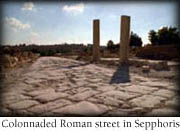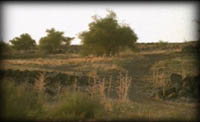Jesus' Social Class
Recent archaeological findings challenge the image of Jesus as a peasant preaching in a pastoral backwater. The Lillian Claus Professor of New Testament Yale Divinity SchoolNow what do you think we can know about Jesus' social class based on recent evidence and discussions?
Recent discussions of Jesus' social class try to locate him within the social structures of Mediterranean society generally, or Galilean society, in the first century. And there seems to be a debate among many contemporary scholars of Jesus as to whether he was really a peasant or... somewhat higher in the socio-economic strata. We know in general he was low class, by the standards of the Roman imperial aristocracy or even of the ruling class of Palestine, the Herodian client kings. But he may have been an artisan. He doesn't seem to have been a peasant in the strict sense, someone who was working the land for a living. He was close, however, to peasant society; all of the images in his parables and his aphorisms are firmly rooted in peasant society and call upon everyday things like a sower, or sowing seed. But they also call upon images of land owners and relationships between slave owners and slaves, masters and servants. So Jesus seems to have been aware of that level of the socio-economic mix. And he may well have stood in some relationship to it. So an artisan of some sort is probably the best way of describing him.
Professor of Classics and Director of the Religious Studies Program University of Texas at AustinTHE GALILEE AND SEPPHORIS
Where did Jesus grow up and how would that have affected his world outlook?
Jesus grew up in Nazareth, a village in the Galilee. Now the Galilee, by most of the traditional accounts, is always portrayed as a kind of bucolic backwater ... cherubic peasants on the hillsides. And yet, our recent archaeological discoveries have shown this not to be the case. Nazareth, itself, is a village ... a small village at that. But, it stands less than four miles from a major urban center, Sepphoris. Now, we see Jesus growing up, not in the bucolic backwater, not... in the rural outback, but rather, on the fringes of a vibrant urban life.
And what kind of a city or town was Sepphoris?
 Sepphoris was founded as the capitol of the Galilee. And so, it was really invested, much like Caesarea Maritima, with all the trappings of Greek or Roman city life as a major center of political activity for that region of the country. As a result, the excavations at Sepphoris have found extensive building programs, theaters, amphitheaters, and that sort of thing, just like Caesarea. What this tells us about the story of Jesus, though, is that Jesus himself would not have been far removed from that vibrant intersection of Greek culture, on the one hand, and traditional Jewish homeland culture on the other.
Sepphoris was founded as the capitol of the Galilee. And so, it was really invested, much like Caesarea Maritima, with all the trappings of Greek or Roman city life as a major center of political activity for that region of the country. As a result, the excavations at Sepphoris have found extensive building programs, theaters, amphitheaters, and that sort of thing, just like Caesarea. What this tells us about the story of Jesus, though, is that Jesus himself would not have been far removed from that vibrant intersection of Greek culture, on the one hand, and traditional Jewish homeland culture on the other.
How cosmopolitan was Sepphoris? Was it multi-lingual?
Sepphoris seems to have been a very cosmopolitan city. We know that it was at least trilingual and maybe tetralingual. That is to say we know that they spoke Aramaic, the vernacular language of most people of the Jewish homeland, but Greek was also quite prominent as well. Some people probably used Latin, although not very many, one would guess. And maybe there are some other languages floating around in the immediate vicinity, as well, because of the various kinds of people that would have gone through Sepphoris. Sepphoris stood right on the major overland route between Caesarea, on the coast, and the Sea of Galilee.
Now, you may have mentioned this, but did they discover weights in different languages in Sepphoris?
The impact of this cosmopolitan trade center, Sepphoris, can be seen from the fact that weights were found, presumably from the marketplace. On one side of the weight, it's registered in Aramaic, on the other side, in Greek. Showing that people could be reading it from whichever tradition they might have come.
More about the discoveries at Sepphoris.
President of the Faculty Union Theological SeminaryNOT A HUMBLE CARPENTER
 The recent discoveries at Sepphoris are extremely controversial..., but the findings really are requiring us completely to rethink Jesus' socio-economic setting, because we really had thought of Jesus as being really out in the hinterland, utterly removed from urban life.... What the excavations at Sepphoris suggest is that Jesus was quite proximate to a thriving and sophisticated urban environment that would have brought with it all of the diversity of the Roman Empire and would have required, just to get on, as the price of doing business, a level of sophistication that one would not have thought characteristic of Jesus, the humble carpenter....
The recent discoveries at Sepphoris are extremely controversial..., but the findings really are requiring us completely to rethink Jesus' socio-economic setting, because we really had thought of Jesus as being really out in the hinterland, utterly removed from urban life.... What the excavations at Sepphoris suggest is that Jesus was quite proximate to a thriving and sophisticated urban environment that would have brought with it all of the diversity of the Roman Empire and would have required, just to get on, as the price of doing business, a level of sophistication that one would not have thought characteristic of Jesus, the humble carpenter....
I would locate Jesus more in the middle-class than in the lower middle-class, than in the lower class of the period. Certainly he would have been multi-lingual, and that causes us to rethink the entire literary heritage and rhetorical heritage that Jesus would have brought to his ministry. So that the discoveries at Sepphoris and the ongoing excavations really force us to recast the mold, if you will, out of which Jesus grows. It's a much more sophisticated and complex mold than had been previously thought.
Professor Emeritus of Religious Studies DePaul UniversityA PEASANT BOY IN A PEASANT VILLAGE
 We know presumably that he grew up in Nazareth. What does that imply about his background and his class?
We know presumably that he grew up in Nazareth. What does that imply about his background and his class?
Jesus being born in Nazareth and growing up in Nazareth tells us that he was a peasant boy in a peasant village. Maybe we might estimate 100 to 200 people maximum in this tiny village perched up in a hill, within sight, by the way, of a fairly major city, Sepphoris, but one of its surrounding villages....
Tradition has it that Jesus was a carpenter. The term is in Greek "tectone" in Mark's gospel..., "artisan" would be maybe our best translation. But in the pecking order of peasant society, a peasant artisan is lower than a peasant farmer. It probably means usually a peasant farmer who had been pushed off the land and has to make his living, if he can, by laboring.
The difficulty for us in hearing a term like "carpenter" is that we immediately think of a highly skilled worker, and at least in North America, in the middle class, making a very high income. As soon as we take that into the ancient world we are totally lost. Because, first of all, there was no middle class in the ancient world. There were the haves and the have nots, to put it very simply. And in the anthropology of peasant societies, to say that somebody is an artisan or a carpenter is not to compliment them. It is to say that they are lower in the pecking order than a peasant farmer. So it's from the anthropologists that I take the idea that a peasant artisan is not a compliment.
There's a theory, though, that Jesus' place of birth gives us a clue to a rather more sophisticated character. Somebody who was just on the doorstep of a Hellenized small town, multi-lingual. He possibly spoke Greek or would have heard it spoken. Possibly could have been influenced by Greek thought or Hellenistic thought. In other words a far more sophisticated guy. Do you reconcile these images or do you flatly disagree with that?
Well, the interesting thing is that as a fact, Jesus never mentioned Sepphoris. And he doesn't use metaphors that tell us profoundly he knows urban societies. He may talk about land owners or bailiffs or stuff like that. There is no evidence that Jesus is any way involved in the urban life of Sepphoris, which is within viewing distance of Nazareth. But to live close to a city in the ancient world was not necessarily a good thing.
What's the argument against him being a more Hellenized, urbanized person? Why do you place him so firmly as a low-class peasant?
Well, a lower class peasant is somebody who is in interaction, not necessarily happy interaction, with a local city. If you take away the city, you don't have a peasant, you have a farmer, a happy farmer, probably. So, first of all, Jesus never mentions Sepphoris, although he grew up within sight of it. He doesn't seem to be talking urban images.
And if he knew anything about Sepphoris, what would he know? He would know that aqueducts take the water from the countryside into the city. And aqueducts run in only one direction. And the city people were the washed, they're the people with the public baths. So, from the countryside into the city, and I don't see any aqueduct coming back, Jesus was sophisticated [enough] to know what the city was, which was the seat of peasant oppression.
Do his travels, or the parables that he teaches, also give us a clue to his probable class, his apparent avoiding of cities?
If you take three parables that are used in the common material in the Q gospel and in the Gospel of Thomas, for example, the parable of the lost sheep, the parable of the mustard seed, or the parable of the leaven. All of those are absolutely ordinary, everyday, rural experiences. They presume no profound knowledge. Anyone would understand them. They speak strict to the rural audience of Jesus. No matter, in a way, who Jesus is or what his background, he is certainly telling his stories for a rural audience. It seems to me, born in Nazareth, speaking to a rural audience, it seems Jesus is a peasant, speaking to peasants.
Samuel Ungerleider Professor of Judaic Studies and Professor of Religious Studies Brown UniversityJESUS AVOIDS CITIES
According to the gospel accounts, Jesus himself comes from a very small town, a town that's virtually otherwise unknown, Nazareth inGalilee, and seems to spend his entire career, as it were, talking to Jews in these small towns or small villages in the Galilee. There are two substantial settlements in the Galilee, Sepphoris and Tiberius, we might call them cities, although that's perhaps a slight loose use of the term.... But Jesus avoids them. That's not where he goes. That's not where he has his followers and it's not where he feels welcome. He's much more comfortable dealing with the villages and the small towns, what we might call the peasants of the society.
And the first time he goes to the big cities of course is when he gets to Jerusalem, at the very end of his ministry or at the very end of his career, with of course, very unfortunate consequences. So primarily then he seems to be a rural phenomenon, or representative of peasant piety or peasant ways, and not the ways of the cities.
But why? Why do you think he didn't go into the cities?
In antiquity there often was social tension between town and country. Not quite the same tension that we have today, where the distinction between town and country is very distinct.... In antiquity, the division was not at all so clear, because people in towns also were agricultural. You walked outside the town walls, walked 15 feet, and there you were in the countryside. So the social contrasts in some respects were much less than they are for us. But in other respects they were a lot more pointed. There was a sense that the cities or the large towns is where the large landowners lived, where the tax collectors lived, where the government officials were, where the judges were, where any outpost of culture will have been found.There was a real cultural and social cleavage then between the peasant ways of the countryside and the towns. This can be seen not just in Judea, but really throughout the Roman Empire. And perhaps then, Jesus and his followers simply were not town types. This is not their culture, not their society, not their ways. They're more comfortable with living with their own kind out in the countryside....
William Goodwin Aurelio Professor of the Appreciation of Scripture, Boston UniversitySEPPHORIS DIDN'T MAKE MUCH DIFFERENCE
What do recent archaeological findings at Sepphoris tell us about Jesus' occupation, his social class, how he made a living?
Sepphoris was known as the jewel of the Galilee. It was one of the capital cities of the Galilee and it's the first capital of Herod's son, who is an independent Jewish client king of Rome during the lifetime of Jesus.... Sepphoris is a beautiful, wealthy city. It's a Jewish city. But like most wealthy Jewish cities in the Greco-Roman period, it's architectural statements are done in Greco-Roman idiom. That doesn't mean that it's Greco-Roman culture. No more than we would think that Thomas Jefferson [was] because Monticello has elements of Greek architecture....
Sepphoris... was moneyed. It was the center of trade for the area. And if Jesus were growing up in Nazareth, which is just a walk for somebody healthy... I think it's something like three miles. If he were a carpenter, or some kind of craftsman, he might have done work in Sepphoris....What does this imply about Jesus' social class? It's hard to know. I think that since he's depicted as a pious Jew, and since pious Jews have a six-day work week, and since on the seventh day they have particular obligations that don't allow them to take long journeys, (on the Sabbath you really are supposed to rest. You're not supposed to hike into Sepphoris and maybe, catch a play in the afternoon, or something like that.) I don't think that culturally, Sepphoris would have made all that much difference. I think as most people in his period who are not landed gentry, Jesus would have worked for a living for six days a week and rested on the Sabbath....
Professor of Religion and Archaeology Duke UniversityJESUS PROBABLY TRILINGUAL
If Sepphoris is such a cosmopolitan city, does that tell us anything about the social class of Jesus? Was he a peasant?
Well, the gospels mention that Jesus and his father were craftspeople, craftsmen. It's very likely that Jesus actually worked in Sepphoris in the time of Antipas' activity there. Of that there's probably no doubt. It's four kilometers away. It's probably the place where all teenagers would have worked, and all the people from Nazareth were crowding into this city being created out of the mound of Sepphoris. So a lot of craftsmen were at work in building up the city Sepphoris. If its high point was a hundred years or 200 years later, like all good Middle Eastern oriental cities there was an agricultural component to Sepphoris. You have a huge activity in the fields beside it. You have satellite villages and satellite industries that attach to the area around the municipal area and territory of Sepphoris. Sepphoris was not just the center, not just a city with houses and with waterworks and with things like that, but it had satellite settlements around. Nazareth to all intents and purposes was a satellite village attached to the region or municipality of Sepphoris. So from this point of view the emerging transformation of this place Sepphoris into a city, I think, affected the entire region around it all the way over to the territory and city of Tiberius, which was built in 17, or begun to be constructed in the year 17. That leaves Jesus as stepping in both worlds, stepping in the world of the city that is being created, and as well participating in the agricultural kinds of activities that all people in Palestine in the first century would have participated in.
Is he a peasant?
I think Jesus was a teacher, a wise person. He was not a peasant if by peasants you mean someone unlettered and untutored. As a wise man, certainly, Jesus participated in the normal education of a good Jewish home and Jewish upbringing in Nazareth or the region. And he was conversant in Greek to the extent that anybody living in this open territory of greater Sepphoris or Tiberius or lower Galilee would have been. You couldn't deal and wheel, either in the workplace or in the market, without knowing a good deal of Greek. And I can hardly imagine anybody worth their salt who wouldn't know some Greek. But Jesus was trilingual. Jesus participated in both the Aramaic and Hebrew culture and its literatures as well as the kind of Hellenistic Greek that he needed to do his business in his travel and his ministry.
